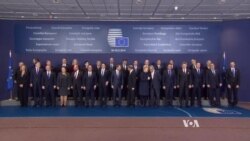With elections slated for several European Union countries this year, analysts say voters are likely to back far right an far left parties critical of the bloc's institutions. They say the EU, which was built on the promise of peace and prosperity, is having a hard time delivering on the latter.
The new normal in Europe is economic stagnation and political mayhem, which few could have predicted.
It all began with the 2008 global financial crisis, which is still plaguing Europe, said Adriano Bosoni, an analyst at the global intelligence company Strategic Forecasting, Inc., more commonly known as "Stratfor.“
"What began as a financial crisis evolved into an unemployment crisis and the austerity measures applied by governments across the continent have created a gap between the voters and the traditional elites, which explains the emergence of Euro-skeptic parties, nationalist parties and protest parties,“ he said.
Debt crisis
Prosperity held Europe together; without it the continent is breaking up. Bosoni said the debate over using investment — or using reform and austerity measures — to boost Europe's failing economies is at the core of the current crisis.
"There are countries who think that to solve the crisis you need to spend more, to invest more to boost growth by pumping more money into the system, which is the position held by Italy and France,“ He said. "But on the other side we see countries who say: 'No, first we should apply structural reforms to your economy and then you should be allowed to spend more.' And that's the position held by Germany.“
Economic strategist Clyde Prestowitz says the European economy has become "Germanized.“
"All of Europe is being squeezed into export-led growth," he said. "Because the debt levels are so high and the Germans are saying — and enforcing — that they won't agree to finance increasing debt.“
While debt and austerity measures are a dominating political issue in southern Europe, immigration is the topic that dominates debates in the North.
In Sweden, Britain and Netherlands a large portion of the general public is against immigrants coming from former Eastern Europe, such as Poland, Romania, Bulgaria.
Shaken foundations
Europe's foundations have also been shaken by secessionist movements in Scotland and Spain.
Even more precarious, in Prestowitz' view, is the proposed referendum on Britain's EU membership — suggested by Prime Minister David Cameron.
"A referendum in the UK could go against the EU, in which case it would be Cameron who precipitated leaving the EU. And he is the head of the most mainstream party in the UK,“ said Prestowitz, Founder and President of the Economic Strategy Institute.
Britain's referendum, he contends, could set into motion an uncontrollable chain of events that could begin the unraveling of EU as a whole.
This year, elections will be held in Greece, Britain, Spain, Poland, Denmark, Finland, Portugal and Estonia. According to most analysts, the likely winners are the far right and the far left parties now railing against European institutions and the parties that back them.





